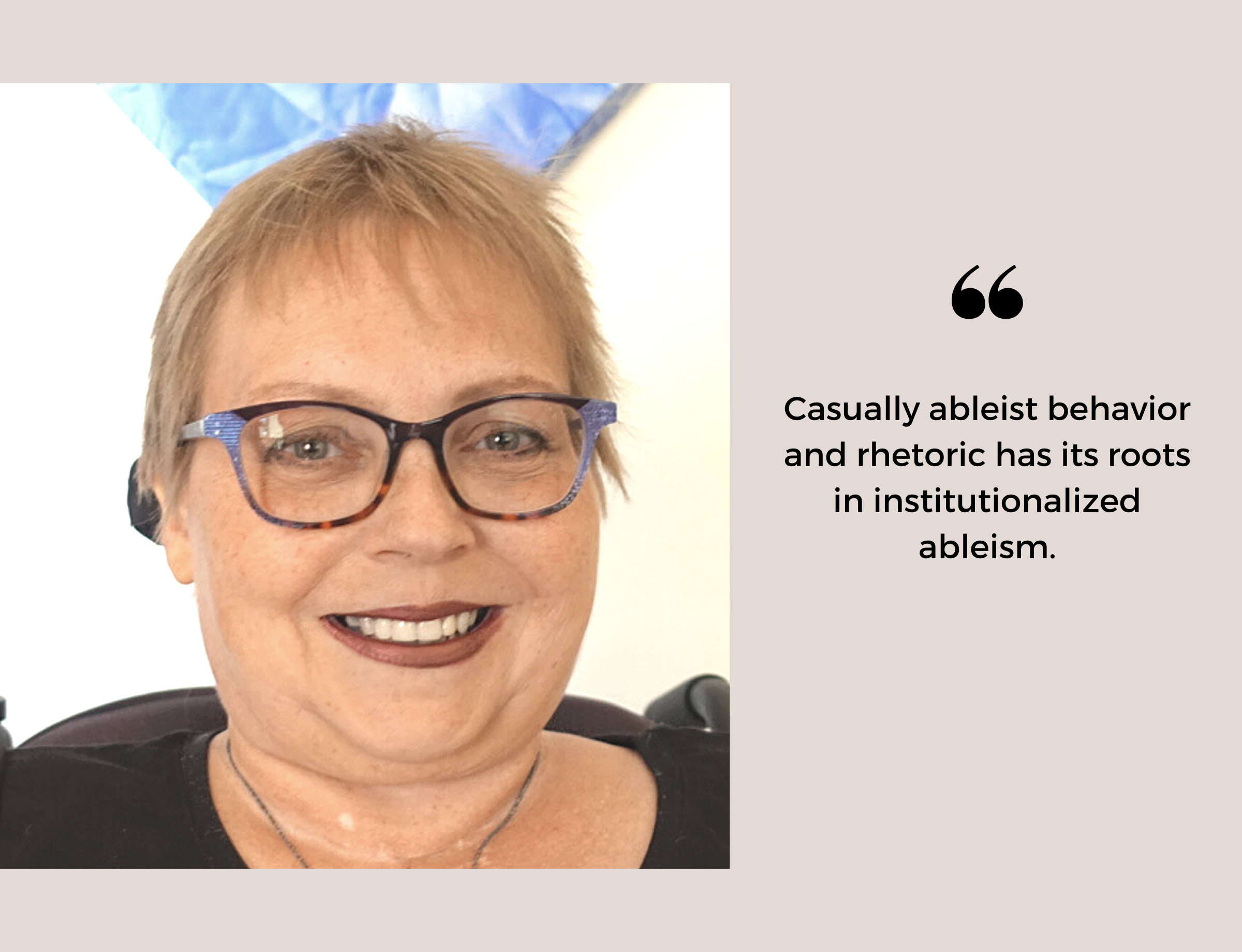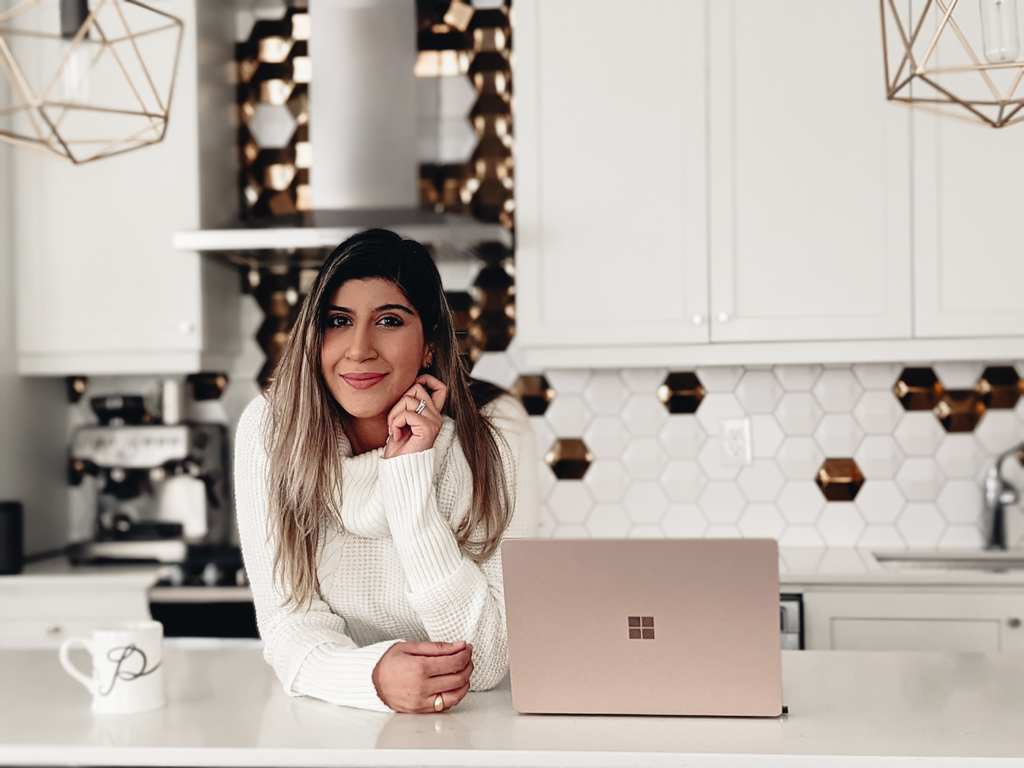Lene Andersen’s words are beautiful, lyrical and full of flair. She is a born writer, a scribe who delivers power and impact with just a few words. When you read her blog The Seated View, you want to know more. You want to sit across from her on a patio, on a languid summer day, chatting over a glass of Sancerre. You want to dig deeper so you too can learn the secret of living with joy and happiness.
Lene (pronounced – Lena) has learned a fleeting truth. Joy takes work. It takes mindful practice. And it’s something she has practiced for a long time. It’s how she has faced and conquered her biggest challenger. You see, Lene lives with Rheumatoid Arthritis (RA).
Born and raised in Denmark, Lene is a health and disability advocate who has lived with RA since she was four years old and used a power wheelchair since her teens. Disability has shared her life for as long as she can remember—in a world that widely accepts ableism.
“I can’t really remember my life without RA. I spent my entire childhood in and out of hospitals, living with chronic pain, and unpredictable illness.”
I found a medication that works. And I discovered the intense joy of living.
“When I became a teenager, things stabilized a little and my family moved from Denmark to Canada. During this time, I got two university degrees and created a full and happy life. The RA hadn’t gone away, but also wasn’t all consuming. Then in 2004, I had what I refer to as my big Flare — with a capital F. It was at that time I came remarkably close to not making it. I had an exit strategy if things didn’t change soon. Then I found a medication that worked (a class of drugs known as biologics). And I discovered the intense joy of living.”
I ask Lene how her life changed after the Flare and the new medications that could help her manage it.
“I remember this moment of being transfixed by a vivid, orange pepper at the St. Lawrence Market in Toronto. It’s really intense to experience moments of joy like that, and you can’t live your life like that all the time, but in that moment, I got my life back. This medication had given me new life and I resolved to become the person I had always wanted to be. Part of it was becoming a writer and part of it, was being happy.”
As a resource and advocate, Lene writes about RA and how it impacts so many facets of a person’s life. In her book, Your Life with Rheumatoid Arthritis: Tools for Managing Treatment, Side Effects and Pain, Lene says, “When you have RA, your whole life has RA.”
I ask Lene what informs her writing.
I am motivated to use my experience of decades living with untreated disability to make the journey easier for others.
“I think we are all looking to make our lives meaningful in one way or another. For me that is using my experience with decades of untreated disability, to make this journey easier for others. It motivates me to help people take shortcuts and get to a place where they can live better with a chronic illness. Beyond the personal, I advocate through my writing and content online to shed light on the dark corners of our world that is left out of view,” she tells me.
“Instagram is a great example—the content portrays a narrow definition of a happy life. And people who live with chronic illness or disability may not relate to that. But we have a right to be part of the world we live in. I think it’s important to use these platforms to help people get unstuck, be less lonely and be seen.” Lene tells me that there are many accounts on Instagram amplifying the conversation around disability through an honest lens.
Lene’s writing is both educational and practical. She writes about the daily challenges of living with RA—a journey many take alone.
Rheumatoid Arthritis is a highly unpredictable disease. You may fall asleep feeling fine and wake up to debilitating pain.
“RA is a highly unpredictable disease. You may fall asleep feeling fine and wake up the next day to realize that the day is a write off because you’re in so much debilitating pain. Some days it’s crushing fatigue and brain fog that messes with your clarity. But a lot of what I write about is how you manage these days. As an example, I started taking naps every afternoon—what I refer to as my Mandatory Rest Periods (MRP). I am blunt about my needs because for healthy people, there is often internalized judgement that napping in the afternoons is indulgent, a luxury or even lazy. For me and for many people living with autoimmune diseases, it’s a necessary part of managing the condition. It taught me a lot about advocating for my needs and being in touch with my body,” Lene says.
“The reality is, that having chronic pain means everything takes more energy. And the fatigue is both physical and mental because your mind is always checking in with the body. Constantly moving against pain, working through it and coping with it is exhausting. That being said, what I have now is so different from before because I grew up in a time without treatment. The fact that I write and that I am an advocate today—that’s possible because of the medication available. It is an interesting dichotomy in one person.”
This brings us to something I’ve been meaning to ask Lene about as much of her writing tackles issues of disability prejudice and that is—ableism, both institutionalized and casual. And how most of us, even allies, engage in unintentionally ableist behavior.
A lot of casually ableist behavior and rhetoric has its roots in institutionalized ableism.
“A lot of casually ableist behavior and rhetoric has its roots in institutionalized ableism. People living with disabilities need support systems to make navigating the world easier. That means accessibility, transportation, buildings that are built to code and allow for modern equipment and availability of good, accessible housing for people living with a disability,” Lene says.
This point jolts me out of my able-bodied stupor as I think about the townhouse development, I currently live in. The homes, even the ones at ground level, are all accessible only by stairs.
“There are economic consequences for people with disabilities as well. The Ontario Disability Support Program (ODSB) averages $1200 a month up to a maximum of $1971 a month per person. That’s less than someone who lost their job due to the economic affects of COVID 19 receives. I think disability assistance like many social support programs is decided on the principle that if you pay people less, you’ll motivate them to work harder. It always comes back to human worth being tied to economic worth, but for people with disabilities, that’s a greater hurdle to overcome. Having a disability costs more as well. If you factor in medications, wheelchair or motorized vehicle repairs, attendant care and so many other basic needs, government assistance doesn’t come close to covering it.”
I ask Lene about casual ableism. A different kind of ableism but just as, if not more insidious than institutionalized ableism, because institutions change when society demands it.
It’s about equity, not equality. We have different needs and should be treated differently to accommodate those needs.
“We still live in a society, that believes you are responsible for your own success. We believe that all things are equal and that we all start on equal footing. How far we go is a matter of pulling ourselves up by our bootstraps. But there are systemic barriers, as is evident across the board. No one wants to admit it, but when you have a disability, people may not want to hire you — even if your disability doesn’t interfere with the work. There are fears that you’ll take too many sick days, that you’ll collapse at work and employers simply don’t want to make accommodations. They may not say it’s because of your disability, but there are inherent biases. So, it’s about equity, not equality. We have different needs and should be treated differently to accommodate those needs,” Lene says, hitting the proverbial nail on the head.
“Ableism exists in ways that you may not even think about. For example, people with disabilities have asked to work remotely for years and were told it’s not possible. Suddenly when almost all businesses were forced to shift to remote work during the pandemic, it became possible.”
If a business put up a sign that says they don’t serve women or people of color or Black people, would you be a patron? But every time you go into a store or public establishment, do you notice if there is an accessibility ramp?
Lene asks me “If a business puts up a sign that says they don’t serve women, or people of color, or Black people, would you be a patron of that business? But every time you go into a store, or a restaurant or any public establishment, have you noticed if there is an accessibility ramp, if there is an automated entrance?” Admittedly, I have not. And that is my able-bodied privilege and internalized bias as a patron of such businesses.
“How many times, have you or people in your life said that something was lame, or asked a non-blind person if they were blind?” Lene asks me.
The honest answer—more times than I care to admit. These words have clear definitions, that are not how we colloquially use them. When we use words for disability as insults, pejoratives or even jokes, we imply that having a disability makes someone “less-than.” But it goes even deeper. Our casually ableist rhetoric uses mental, physical and chronic disability as expressions e.g. I am so OCD about cleanliness. Appropriating language from disabled communities is harmful and dangerous. It’s what perpetuates negative stereotypes, it’s what allows our governments to ignore allocating resources, or building agendas to support members of our community. It’s what allows people to remain unseen.
I grew up not knowing anyone like me. Then I found the online RA community and it felt like coming home. RA has always shared my world. And it has allowed me to choose living with joy.
But Lene is optimistic. “The digital age is changing things and has opened up opportunities for people who live with disabilities. It has changed my life—I wouldn’t be a writer without it. I use voice recognition software to write, I have a platform where I can share my words and experiences with others going through something similar and with the world. I grew up not knowing anyone like me. And then I found the online, RA community. It felt like coming home. I found a community I don’t have to explain things to. RA has taken things from me, it’s a painful, rough disease. But it has given my life so much meaning too. It has given me friends, a career, a community and a life I love. RA has always shared my world. And it has allowed me to choose living with joy.”
Disability is the only minority group that any single person can become a part of at any time in their life.
David Onley, Former Lieutenant Governor of canada
As former Canadian Lieutenant Governor, David Onley said “Disability is the only minority group that any single person can become a part of at any time in their life.” Unlike other marginalized groups within society, any of us can wake up tomorrow unable to climb a flight of stairs, or read road signs, or process information conventionally. The next time you leave your house, take a moment to recognize all the little ways in which the world we’ve built places hurdles for so many. If I see six stairs, they are just stairs. But for many others, they are a wall.
Lene Andersen is an award wining writer, health and disability advocate and photographer living in Toronto Canada. She has a Masters Degree in Social Work and is the Community Leader of HealthCentral RA site. Lene shares her home with a cat and too many books.
She is the author of Chronic Christmas: Surviving the Holidays with a Chronic Illness available on Amazon US, Amazon CA and Amazon UK and Your Life With Rheumatoid Arthritis available on Amazon US, Amazon UK, Amazon CA, and all other Amazon sites, CreateSpace, Barnes & Noble Nook, Apple iBooks and Kobo Books.






